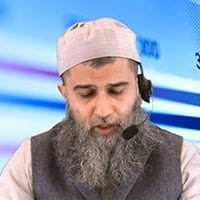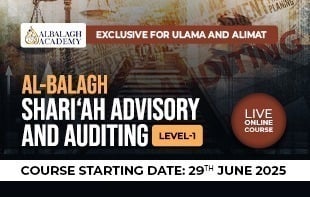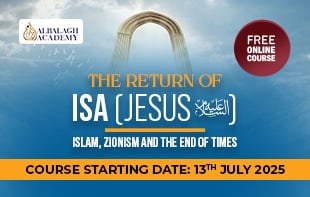(CEO of RG Group)
Mufti Amjad Mohammed
Mufti Amjad Mohammed is a prominent Islamic scholar whose expertise in Islamic jurisprudence, education, and academic leadership has made him a respected figure in the Islamic world. As a lecturer at Al Balagh Academy, UK, he brings a wealth of knowledge and experience to the students of the institution, guiding them through the complexities of Islamic law, ethics, and traditional sciences. Mufti Amjad’s contributions to Islamic education, coupled with his pioneering work in global industries, make him a unique blend of academic scholar, educator, and visionary leader.
Academic and Educational Leadership
Mufti Amjad Mohammed is not only a lecturer at Al Balagh Academy, but he is also the founder and principal of Dār al-ʿUlūm al-Zaytuniyya, an Islamic seminary in Bradford, UK. The seminary offers the traditional ʿĀlimiyya course, training future Imams and scholars in a comprehensive understanding of Islamic jurisprudence, theology, and Ḥadīth studies. Through this seminary, Mufti Amjad has shaped the academic journey of numerous students, helping them contribute to the global Islamic community.
As Dean and Head Researcher of the Institute for the Revival of Traditional Islamic Sciences (IRTIS), Mufti Amjad’s academic work focuses on the relevance of traditional Islamic sciences in contemporary society. His research emphasizes bridging the gap between classical Islamic scholarship and the modern world, providing critical insights into how Islamic knowledge can be applied to today’s challenges. His work with IRTIS not only advances Islamic scholarship but also addresses the needs of Muslim minority communities in the West.
In his capacity as a lecturer at Al Balagh Academy, Mufti Amjad teaches Islamic jurisprudence and Ḥadīth studies, guiding students through the foundational texts and principles of Islamic law. His teaching methods encourage critical thinking and application of Islamic knowledge in addressing modern-day issues, making him a key figure in shaping the future of Islamic scholarship.
Public Service and Scholarly Contributions
Mufti Amjad’s contributions to public service are vast. As the Principal Jurisconsult at Markaz al-Iftāʾ wa’l-Qaḍāʾ, he offers scholarly guidance on a wide array of issues affecting the public. His expertise in Islamic jurisprudence allows him to provide legal opinions (fatwas) on complex issues related to ethics, finance, and social concerns. His role extends to providing advisory services to various public sectors and organizations, ensuring that Islamic principles are upheld in decision-making processes.
His leadership also extends to Wifaqul Ulama, where he chairs the organization and actively addresses the challenges faced by Muslim minorities in the UK. Through scholarly discourse and action, Mufti Amjad works to ensure that the rights and needs of Muslim communities are addressed in accordance with Islamic teachings.
Industrial and Scientific Expertise
In addition to his scholarly contributions, Mufti Amjad Mohammed has a strong background in the sciences, particularly in polyacrylamide chemistry. His pioneering research in this field has resulted in groundbreaking patents and innovations that have revolutionized industries such as paper manufacturing. His work led to the development of novel chemistries that significantly impacted the global market, showcasing his ability to blend scientific innovation with ethical principles.
Mufti Amjad’s patents, including innovations related to dewatering suspensions and the use of encapsulated material blended with flocculants, demonstrate his capacity for creative problem-solving and his contribution to global industries. His expertise in both Islamic jurisprudence and industrial innovation highlights the breadth of his knowledge and his ability to contribute meaningfully to diverse fields.
Media Presence and Islamic Finance
Mufti Amjad Mohammed is also a recognized media personality, hosting a television show that reaches a global audience. His show covers a range of topics from Islamic jurisprudence to contemporary issues affecting the Muslim world, making him a trusted source of knowledge for viewers around the globe.
In the realm of Islamic finance, Mufti Amjad Mohammed serves as the Chief Shariah Officer at NZF Worldwide, where he oversees zakat collection and distribution in compliance with Shariah law. His role involves ensuring that financial practices align with Islamic principles, offering guidance on ethical financial dealings, and advising organizations on the proper management of charitable funds.
Additionally, Mufti Amjad plays a key role at Eternal Gardens, a Muslim burial service, where he serves as the Principal Jurisconsult. His expertise in end-of-life services ensures that burial practices are conducted in accordance with Islamic traditions, providing comfort and assurance to Muslim families during difficult times.
Leadership in Charitable and Ethical Business Practices
Mufti Amjad is deeply involved in charitable work through his association with organizations such as the Olive Foundation and Al Khair Foundation. These organizations benefit from his expertise in Islamic ethics and jurisprudence, ensuring that their charitable work is aligned with Islamic teachings. His contributions help shape the vision and mission of these organizations, promoting ethical practices and community service.
As the co-founder of RG Advisory, Mufti Amjad exemplifies his commitment to creating global opportunities through ethical business development. RG Advisory’s mission is to foster a more united global community through sustainable business practices, and Mufti Amjad’s leadership ensures that this mission is carried out with integrity and a focus on long-term ethical success.
Conclusion
Mufti Amjad Mohammed’s influence in Islamic scholarship, education, and global industries is profound. His ability to navigate both traditional Islamic sciences and modern challenges makes him a key figure in shaping the future of Islamic education. As a lecturer at Al Balagh Academy, he continues to inspire and guide students, while his broader contributions to Islamic jurisprudence, industrial innovation, and public service demonstrate his dedication to advancing Islamic knowledge in every field he touches.





